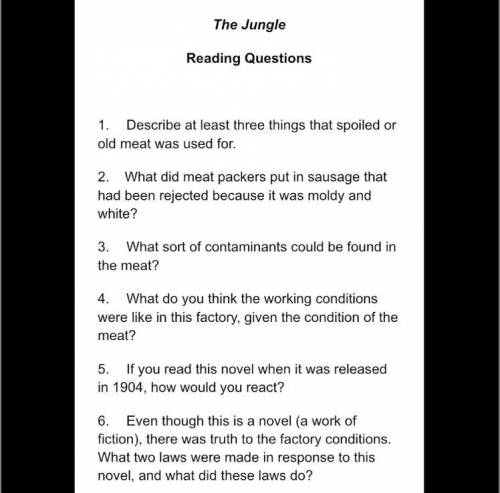
History, 19.01.2021 21:40 colestout2993
With one member trimming beef in a cannery, and another working in a
sausage factory, the family had a first-hand knowledge of the great majority of Packingtown swindles. For it was the custom, as they found, whenever meat was
so spoiled that it could not be used for anything else, either to can it or else to
chop it up into sausage. With what had been told them by Jonas, who had
worked in the pickle rooms, they could now study the whole of the spoiled-meat industry on the inside, and read a new and grim meaning into that old Packingtown jest — that they use everything of the pig except the squeal.
Jonas had told them how the meat that was taken out of pickle would often
be found sour, and how they would rub it up with soda to take away the smell, and sell it to be eaten on free-lunch counters; also of all the miracles of chemistry which they performed, giving to any sort of meat, fresh or salted, whole or|
chopped, any color and any flavor and any odor they chose. In the pickling of hams they had an ingenious apparatus, by which they saved time and increased the capacity of the plant - a machine consisting of a hollow needle attached to a pump; by plunging this needle into the meat and working with his foot, a man could fill a ham with pickle in a few seconds. And yet, in spite of this, there would be hams found spoiled, some of them with an odor so bad that a man could hardly bear to be in the room with them. To pump into these the packers had a second and much stronger pickle which destroyed the odor known to the workers as "giving them thirty per cent." Also, after the hams had been smoked, there would be found some that had gone to the bad. Formerly these had been sold as "Number Three Grade," but later on some ingenious -a process person had hit upon a new device, and now they would extract the bone, about which the bad part generally lay, and insert in the hole a white-hot iron. After this invention there was no longer Number One, Two, and Three Grade only Number One Grade. The packers were always originating such schemes - there was | they had what they called "boneless hams," which were all the odds and ends of pork stuffed into casings; and "California hams," which were the shoulders, with big knuckle joints, and nearly all the meat cut out; and fancy "skinned hams, which were made of the oldest hogs, whose skins were so heavy and coarse that no one would buy them -that is, until they had been cooked and chopped fine and labeled "head cheese!"
It was only when the whole ham was spoiled that it came into the department of Elzbieta. Cut up by the two-thousand-revolutions-a-minute flyers, and mixed with half a ton of other meat, no odor that ever was in a ham could make any difference. There was never the least attention paid to what was cut up for sausage; there would come all the way back from Europe old sausage that had been rejected, and that was moldy and white — it would be dosed with borax and glycerine, and dumped into the hoppers, and made over again for home consumption. There would be meat that had tumbled out on the floor, in the dirt and sawdust, where the workers had tramped and spit uncounted billions of consumption germs. There would be meat stored in great piles in rooms; and the water from leaky roofs would drip over it, and thousands of rats would race about on it. It was too dark in these storage places to see well, but a man could run his hand over these piles of meat and sweep off handfuls of the dried dung of rats. These rats were nuisances, and the packers would put poisoned bread out for them; they would die, and then rats, bread, and meat would go into the hoppers together. This is no fairy story and no joke; the meat would be shoveled into carts, and the man who did the shoveling would not trouble to lift out a rat even when he saw one — there were things that went into the sausage in comparison with which a poisoned rat was a tidbit. There was no place for the men to wash their hands before they ate their dinner, and so they made a practice of washing them in the water that was to be ladled into the sausage. There were the butt-ends of smoked meat, and the scraps of corned beef, and all the odds and ends of the waste of the plants, that would be dumped into old barrels in the cellar and left there. Under the system of rigid economy which the packers enforced, there were some jobs that it only paid to do once in a long time, and among these was the cleaning out of the waste barrels. Every spring they did it; and in the barrels would be dirt and rust and old nails and stale water — and cartload after cartload of it would be taken up and dumped into the hoppers with fresh meat, and sent out to the public’s breakfast. Some of it they would make into “smoked” sausage — but as the smoking took time, and was therefore expensive, they would call upon their chemistry department, and preserve it with borax and color it with gelatine to make it brown.


Answers: 2
Another question on History

History, 21.06.2019 14:30
The national college football team hampionship this year will be contest
Answers: 1

History, 21.06.2019 18:00
How did chinese culture change during the warning stated period
Answers: 3

History, 21.06.2019 19:10
30 ! seneca falls: common ground by andrea brecheen the seneca falls convention of 1848 was the single-most important event of the early women's suffrage movement. the suffrage movement grew out of centuries of shameful and unfair treatment of women. at the time of the convention, women did not have the right to vote or serve on juries, and many women were unable to inherit property. in the decades leading up to the convention, a small group of women began to rebel against these injustices. suffrage originated from women's participation in the anti-slavery and temperance movements. the seneca falls convention was the first conference dedicated to women's rights. the convention was organized by two female abolitionists, elizabeth cady stanton and lucretia mott. lucretia mott was an eloquent quaker social reformer. mott had previously been denied the right to speak at an anti-slavery conference in london after the men voted to exclude women from participating. unlike many women of her time, elizabeth cady stanton received a formal education. at the age of 16, stanton studied mathematics, latin, and greek, demonstrating her keen abilities by mastering the subjects alongside boys of her own age. coming together to support the suffrage movement, mott and stanton organized the convention in seneca falls, ny in july of 1848. during the six-day meeting, stanton presented the declaration of sentiments, a document she based on the declaration of independence. in the declaration, she so elegantly wrote, "we hold these truths to be self-evident: that all men and women are created equal." the declaration included a list of grievances detailing the treatment of women. the declaration was signed by sixty-eight women and thirty-two men. following the convention, in 1848 the new york state assembly passed the married women's act. this act protected property that women brought into or earned during marriage. read the passage. which sentence best represents a fact about elizabeth cady stanton detailed in the text? a "unlike many women of her time, elizabeth cady stanton received a formal education." b "in the declaration, she so elegantly wrote, 'we hold these truths to be self-evident: that all men and women are created equal.'" c "stanton rightly believed it should the law should be changed to make it easier for women to get divorces and keep their access to their children." d "at the age of 16, stanton studied mathematics, latin, and greek, demonstrating her keen abilities by mastering the subjects alongside boys of her own age."
Answers: 2

History, 21.06.2019 20:10
At the time of hitler's 1939 invasion of poland, the us had a policy of appeasement negotiation opposition neutrality
Answers: 3
You know the right answer?
With one member trimming beef in a cannery, and another working in a
sausage factory, the family...
Questions

History, 27.06.2019 07:50




History, 27.06.2019 07:50

Biology, 27.06.2019 07:50


Physics, 27.06.2019 07:50


Mathematics, 27.06.2019 07:50


Mathematics, 27.06.2019 07:50


History, 27.06.2019 07:50

Physics, 27.06.2019 07:50



Mathematics, 27.06.2019 07:50


English, 27.06.2019 07:50




